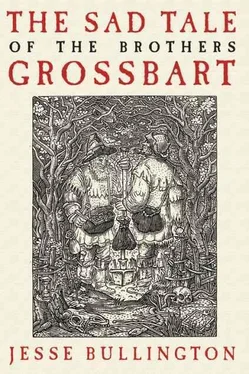“Lou Garou?”
“Yeah, them folks what turn into wolves.”
“That demon look like a wolf to you?”
“No need to condescend,” said Hegel. “Chance Old Scratch tricked him, turned’em into somethin else. Sides, look at his bones, more like a man than a cat’s or a demon’s.”
“Or a wolf’s.”
“Well, I never heard a no demon preferred daylight to moonshine.”
“Manticore,” whispered Manfried, his eyes widening.
“How’s that?”
“Goddamn, brother, we killed us a manticore!” Manfried clapped Hegel’s shoulder. “Heard mention a them from Adrian.”
“Which Adrian? Huge Adrian?”
“Nah, Stout Adrian. Yeoman we camped with two summers back what had a predilection for sheep.”
“Huge Adrian had a taste for bleaters, too, if I recall. Reckon they’s kin?”
“Possible,” said Manfried. “Regardless, Stout Adrian was sayin his da’s da’s uncle’s cousin or some such went off to Arabland in his younger days, and there was thick with manticores.”
Hegel scowled. “Mean there’s more a them things where we’s for?”
“Yeah, but we’s in practice now.”
“Why don’t I recollect him talkin bout’em?”
“Probably drunk. I think he said they’s poisonous, too.”
They both took a step back from the corpse.
“Manticore skin burn?” Hegel asked.
“Dunno. Best bury it rather than takin a chance. If it’s poison-pelted it might let off vapors if we try, kill us dead.”
They dug a shallow pit and peeled the hide from the remains with a branch. Hegel dropped the stick in with it and refilled the hole. Manfried had surreptitiously gone to a large pine and carved their sign into the trunk with his dagger: a crude G, the only character the illiterate Brothers knew. If they ever came back through these parts he wanted to be able to dig it up and see if it kept its luster underground.
Tamping the rocky earth, Hegel gave a final scowl to the decapitated skeleton and began trudging in what he hoped was the direction of their camp. Manfried hurried after, giving the tree a final jab for good measure. Hegel had seen Manfried’s endeavor, however, and several times he feigned urinating to creep off and mark other large pines in a similar fashion. He had no intention of ever coming this way again, but one could not be overly cautious when a soul was in danger. Hegel had long ago realized his brother occasionally became fixated on things he ought not to.
Eventually they found the stream again, the winter-dust thickening along its banks, and from there picked their way back to Manfried’s ditched crossbow. After pawing through the under-growth for an hour they discovered his ax, and from there the camp quickly came into sight. Horse lay gutted, his corpse still warm and his head mangled. Their belongings were scattered all over the ground, and the monster had taken the time to piss on their blankets, the ammonia stink turning their raw stomachs.
Still badly shaken, the Grossbarts rekindled the embers and sat in the falling snow, oblivious to the storm-grumbles and how cold the air had turned. Hegel wasted no time in cutting into Stupid’s legs and heaping spits with the fresh meat. He avoided any areas where claw marks rent the skin, greatly displeased that the creature had attacked the head. He had looked forward to more headcheese but would be damned before he would risk being poisoned.
Manfried helped his brother skin Horse, pitching the wide flaps of hide upright to cure beside the fire. They had already burned the tainted blankets, only one of them spared a soiling. The meat went down far better than turnips, and the two soon felt rejuvenated.
The flurries and impotent thunder abated and the light faded, leaving them damp and dark. Neither had the strength to tend the coals throughout the night, let alone keep watch, but the bitter cold forced Hegel awake several times to blearily rekindle the fire. He sat up and began eating before cockcrow, mulling over the previous day. Be it shapechanger, demon, or manticore, they had definitely smote it back to Hell. When the snow began floating down again and the haze of morning arrived, he went to wake his brother, meaning to have a word with him about the propriety of leaving some things alone. Manfried would not stir, despite Hegel’s mounting efforts. He would not awaken at all, for his arrow-punctured ear had reopened and turned sour, infecting him with a mortal fever.
“Death,” said the priest, “is not the end, Heinrich. You know this.”
“Do I?” Heinrich flexed his toes in the too-tight turnshoes Egon had given him. The dry clothes were of course appreciated after a night in the wet mud choking on a turnip, but the carpenter had obviously failed to deliver the two things Heinrich truly wanted. That the rest of the jury had not returned hardly surprised the yeoman, having experienced firsthand what the Grossbarts were capable of.
“Outliving one’s family is the greatest test of our faith. While this is your supreme loss, it is hardly your first,” the priest said gently. “The stillborn child and the other-”
“Two were stillborn, Father.” Heinrich glowered at the man. “And what of Gertie and Brennen and my three girls? Been too long since we all seen you. What if-” Heinrich choked on the words and the thought of damnation.
“Heinrich,” said the priest. “We’ve been through this. It’s not as if your wife or children committed the sort of sins that would require my intercession!”
“What did you say?” Heinrich felt chills spiraling up his legs into his bowels. “Sins requiring intercession?”
“I said, it’s not as if they committed the sort of wickedness that might damn a soul were it not absolved by a priest. We all have our little foibles but the good Lord has-What are you doing?” The priest blinked at Heinrich, who had jumped to his feet. The grieving turnip farmer went straight to Egon’s table and snatched up a knife. The priest would have called Egon and his wife back inside the carpenter’s hovel but Heinrich had turned back around.
“Absolution. Penance. Forgiveness.” Heinrich shook the knife at the priest, his voice cracking. “You saying there’s a way?”
“A way? Heinrich, the knife-”
“Oh.” Heinrich crouched and cut into his soiled leather hose heaped near the door, gritting his teeth at the exertion but watching the priest intently. “If they get to one of yours and confess and do the work, they’ll be forgiven. Is that what you’re saying to me?”
“Ah,” said the priest. “Well…”
“That’s it, isn’t it?” Heinrich stood, wrapping the blade in a strip of leather cut from his hose and dropping the knife into the single pocket of his tunic. “I’m off then, Father.”
“What?” the priest nervously backed toward the door as Heinrich advanced. “Where are you-”
“Think I’ll forget? Think I’ll forgive?” Heinrich glared at the priest, whose back now met the wooden door. “Excuse me, there’s work to be done.”
Sliding out of the way, the priest waited a beat until Heinrich had flung open the door and stepped out into the daylight before following. The priest knew something had changed inside the farmer and suspected that unless he acted quickly sin might well beget sin. Egon’s eldest son bumped into the priest as he went outside and he saw Egon arguing with Heinrich in the yard, several other villagers approaching from their respective homes near the manor house.
“What’s he on about?” the lad asked. “He looks worse than he did the day after they-”
“Hush, boy,” said the priest, emboldened by the sun and the witnesses. “Ho, Heinrich, be still!”
Heinrich and Egon both turned to the priest, a small crowd quickly forming. Among them were the kin of those jury members the Grossbarts had murdered on the mountainside. The priest and the farmer squared off on either side of the group, and the priest sensed his chance to shame the man into obedience.
Читать дальше












